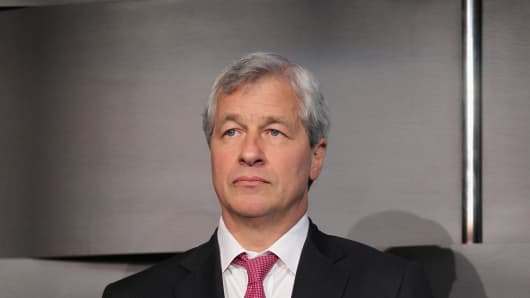JPMorgan Chase's shareholder meeting doesn't take place until next Tuesday, but votes from investors holding some 3.45 billion shares are starting to trickle in.
At the forefront of the agenda is a non-binding proposal to separate the company's chairman and CEO roles, both currently held by Jamie Dimon. Currently, the number of votes cast in favor of splitting the roles is less than a majority, sources say, though cautioning that still could change.
Here's why: Large index funds typically wait until the last 48 hours to cast their votes. In this case, those funds—like BlackRock, Vanguard, and State Street—make up roughly 15 percent of JPMorgan's shareholder base, according to FactSet.
There's also a large set of investors that, regardless of their ideology, will let proxy adviser Institutional Shareholder Services (ISS) cast a vote on their behalf. ISS recently issued a report supporting the split, which means many shareholders will follow suit.
"The rule of thumb in large, S&P 500 companies is that roughly 25 percent of investors make up this group," said David Drake, president at proxy solicitor Georgeson, which advises companies on these matters. That group was likely the anchor of the 40 percent of shareholders that supported a similar proposal to split CEO/chairman roles last year at JPMorgan, even before the bank's regulatory issues escalated.
For those reasons, the decision is likely to be made in the margins. Media reports seem to be calling it as close vote, too: A Wednesday Wall Street Journal headline claimed the split was gaining momentum. At the Financial Times, reporters said Dimon would likely be "spared" by investors, while support for the board was waning.
(Read More: Trading Jamie Dimon's Possible JPM Exit)
In a recent meeting with investors, Dimon said he might leave the bank if the proposal won support. "He was throwing it out there as one of a number of different possibilities," said Glenn Schorr, an analyst at Nomura Securities, who hosted the meeting. Dimon said he would make that decision once the vote happened, according to Schorr.
Scores of companies have moved recently toward establishing separate roles for chairmen and CEOs. Among them: Hess Corp., Chesapeake Energy, Occidental Petroleum, Moody's Investor Services, and Wellpoint. Performance at those companies has been mixed.
The only banks to ceremoniously split the roles were Bank of America and the now-defunct Wachovia, before ousting the chief executives altogether amid financial crisis woes.
Shares of JP Morgan Chase are flat since December 2006—when Dimon assumed the chairmanship, thus giving him both roles – but have significantly outpaced the bank's peers, most of which remain far below pre-financial crisis levels.
Still, Dimon is regarded as a best-in-class manager that has steered the bank well through difficult times—even Warren Buffett said he supports Dimon "100 percent." The notion that public interest could turn so sharply against management has executives across Fortune 500 companies watching the situation with keen interest, thinking if it could happen at JPMorgan Chase, it could happen anywhere.



